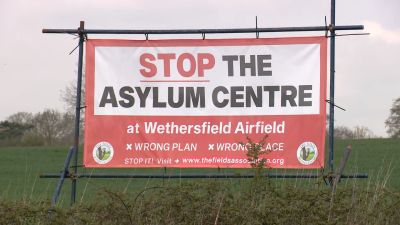Bid to block government's Wethersfield airfield asylum seeker plans for Essex begins in High Court

A Tory council has asked judges to block the government's plans to house asylum seekers on a former military airbase in its area - as a refugee support worker said it was now taking more than a year for applications to be decided.
Ministers want to accommodate up to 1,700 people at Wethersfield airfield in Essex for up to 180 days each while they wait for a decision on whether they can stay.
The government's own guidelines say asylum seekers should receive a decision within six months.
But an Essex refugee support worker said the average was currently 486 days - with the number of people waiting for a decision having quadrupled since 2016.
Maria Wilby, director of Refugee, Asylum Seeker and Migrant Action based in Colchester, said: "When I first started this work, there weren't hotels. There was no need for them."
On Wednesday, Braintree District Council asked High Court judges to grant an injunction that would stop Wethersfield airfield being used - arguing the need to house asylum seekers does not count as an "emergency" under planning law.
The Home Office and Ministry of Defence oppose the legal action and want the case to be thrown out.
Is this 'Nimbyism' in action?
Speaking outside the court, campaigner Alan MacKenzie, chairman of the Stop Wethersfield Airfield Prisons (Swap), said this was not about "nimbyism".
"It's not a case of 'not in my back yard," he said. "It's [about] where is the best place to put these developments.
"It's totally inappropriate to put them in the middle of nowhere.
"There are no services, the health service isn't there, the social services isn't there, the police to support the area aren't there. There is nothing there."
The use of the MoD-owned land was announced last month as part of immigration minister Robert Jenrick's plans to house asylum seekers in disused military bases to reduce reliance on hotels.
Mr Jenrick previously said the sites were "undoubtedly in the national interest" and said only "single adult males" would be put into the barracks, as he sought to reduce a hotel bill he put at £2.3bn a year.
What is the council's argument?
During Wednesday's hearing Wayne Beglan, for the council, told the High Court in London the plans would be a breach of planning control - and that the rules the government wants to use to allow it are designed to address emergencies only.
He told the court that covered "something that happens on a sudden and unexpected basis and has to be catered for".
The court was told the planning provision - known as Class Q - covers the change of use of some government land by the Crown to prevent or mitigate an emergency which "threatens serious damage to human welfare".
Mr Beglan said in written submissions: "Mere pressure on resources is not an emergency. These are policy issues which are addressed, from time to time, by evolving policy decisions.
"They are not emergencies sufficient to justify circumventing the normal planning controls."
He added that the need to cut costs did not count as an emergency.
What is the government's argument?
Paul Brown KC, for the Home Office, said in written submissions that, as of last month, it was estimated that the department was accommodating over 109,000 asylum seekers, 48,000 of them in hotels, at a total cost of over £6.2m per day.
"Significantly, the number needing support is predicted to grow still further: Home Office operational plans are based on scenarios of up to 56,000 small boat arrivals in 2023. That would take the supported population to between 120,000 and 140,000," the lawyer said.
Mr Brown said there was a "pressing need for suitable accommodation" and that Wethersfield Airfield was "not in a sensitive or designated area".
The barrister denied there would be a breach of planning control, telling the court there was an "overwhelming argument that it is authorised" under the provision.
He continued in written submissions that whether something is an emergency "is solely a matter for the government department" exercising the development right.
The barrister later said that "the reasons why there is an emergency" had been explained to the council.
He continued: "The current circumstances constitute an 'emergency' within the Class Q definition.
"Given the number of asylum seekers concerned, and the vulnerability of that cohort, the scale of damage is potentially significant, i.e. the situation 'threatens serious damage' to human welfare."
Mr Brown later said it was not sustainable for the Home Office to continue using hotels to accommodate asylum seekers "not only because of the cost but also because the supply of accommodation is precarious and has led to strained relations with local authorities".
The hearing before Mr Justice Waksman is due to conclude on Wednesday.
Want a quick and expert briefing on the biggest news stories? Listen to our latest podcasts to find out What You Need To Know